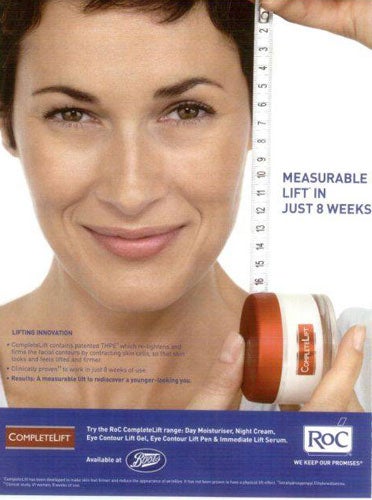Anti-wrinkle cream ad was misleading, rules advertising watchdog

Your support helps us to tell the story
From reproductive rights to climate change to Big Tech, The Independent is on the ground when the story is developing. Whether it's investigating the financials of Elon Musk's pro-Trump PAC or producing our latest documentary, 'The A Word', which shines a light on the American women fighting for reproductive rights, we know how important it is to parse out the facts from the messaging.
At such a critical moment in US history, we need reporters on the ground. Your donation allows us to keep sending journalists to speak to both sides of the story.
The Independent is trusted by Americans across the entire political spectrum. And unlike many other quality news outlets, we choose not to lock Americans out of our reporting and analysis with paywalls. We believe quality journalism should be available to everyone, paid for by those who can afford it.
Your support makes all the difference.There is no firm evidence that a best-selling skin cream reduces wrinkles, an official investigation has found.
In the latest blow to the reputation of creams offering women the elixir of youth, the Advertising Standards Authority ruled that Johnson & Johnson's sales pitch for RoC Complete Lift was not supported by "robust science".
In press advertising, Johnson & Johnson claimed a two-month clinical study proved that its product gave middle-aged women young-looking skin. An independent expert found, however, that the study's methodology was flawed because it lacked objective measures, records and corroborating photography. In addition, it had been carried out by a Johnson & Johnson employee.
"We concluded the ad was misleading," said the ASA, which banned the advert and warned the US medical, pharmaceuticals and consumer giant to consult the Committee of Advertising Practice before advertising again.
The ruling, made public today, is the latest of several blows to the reputation of skin creams in recent years, including four last year: against Avon's ThermaFirm; The Body Shop's Wise Woman; Nivea's DNAage cream; and Clarins' Expertise 3P – which claimed to protect women against "electromagnetic waves".
Three years ago, the ASA criticised L'Oreal's campaign for Anti-Wrinkle De-crease featuring the German supermodel Claudia Schiffer. In the same year, the watchdog criticised claims made for Estée Lauder's anti-cellulite Visible Contouring Serum. The ASA has also made rulings against skin creams made by Chanel, Max Huber and Dior in recent years.
In the latest embarrassment to the £15bn-a-year global cosmetics industry, Johnson & Johnson claimed that women who used RoC CompleteLift would experience a "measurable lift".
A patented ingredient in the product called THPE was "clinically proven to work in just 8 weeks of use," the advert said. A footnote explained: "Clinical study, 41 women, 8 weeks of use."
Members of the public complained after noticing another statement in the small print that the product did not give a "physical lift".
Johnson & Johnson said in its defence that its research showed the product gave a "measurable lift" as long as people used it – rather than a permanent lift.
An experienced grader had applied a placebo cream and the RoC CompleteLift product to each side of the faces of 41 women aged between 45 and 65. After eight weeks, the company said, the placebo side had "very pronounced sagging" while its product had ensured "no sagging at all." Most of a further 204 women who had tried the cream were also satisfied by its lifting action, Johnson & Johnson added.
A 50ml tub costs £17.99.
Join our commenting forum
Join thought-provoking conversations, follow other Independent readers and see their replies
Comments